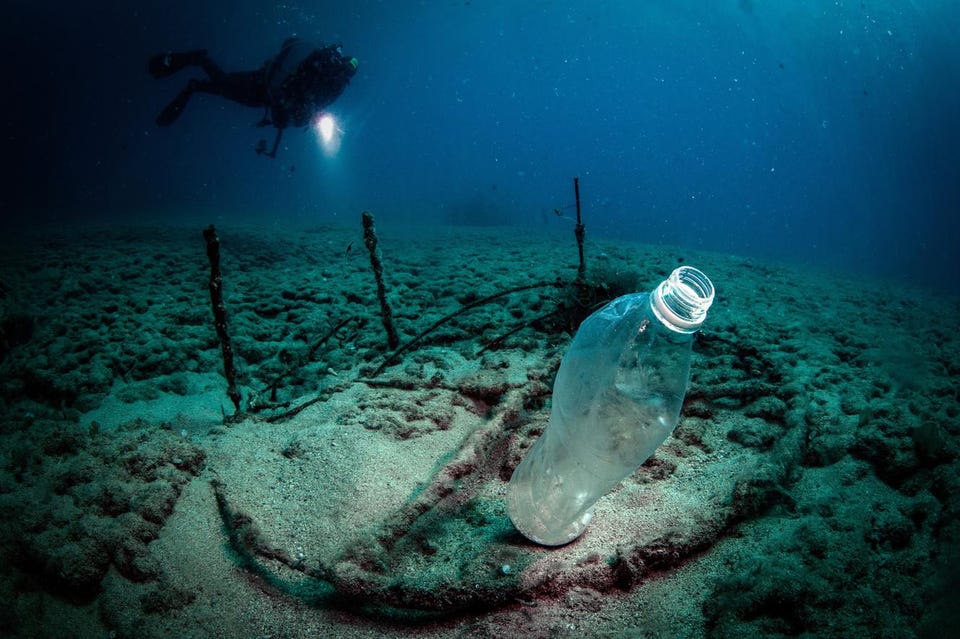Recycling Alone Will Not Solve The Plastic Pollution Crisis, Experts Warn


HATAY, TURKEY – JUNE 04: A diver with a flashlight descends into the water and flash a plastic bottle up at the Samandag diving site off the coasts of Samandag, near the Turkey – Syria border, in Hatay province of Turkey on June 04, 2019. Divers, making research around the area, also pick up wastes. Plastic pollution, seen in diving at Mount Kel, point up the danger for marine species, wildlife habitat and environment. Samandag coast, which is becoming a popular destination for diving tourism in recent years as its provides rich underwater scenery and with its similarity to the Red Sea in terms of its underwater richness, is facing the danger caused by underwater wastes.
The recent agreement by the United Nations to protect the world’s oceans has once again highlighted the importance of marine nature.
The recently agreed High Seas Treaty aims to help place 30% of the seas into protected areas by 2030.
The aim is to help safeguard and recuperate marine nature, but what can be done to tackle to other growing issue faced in oceans and waterways around the world – plastic pollution.
A new research paper out today (8 March) in Plos One by the 5 Gyres Institute warns the situation is now so extreme that policymakers should stop solely focusing on clean-up and recycling.
Instead, it argues they should put far greater emphasis on reuse and tackling the problem at source.
Institute co-founder Dr. Marcus Erikson told Forbes the production of single-use plastic has been the “major culprit” and there are now more than 170 trillion plastic particles afloat in the world’s oceans.
Dr. Erikson said clean-up programmes aimed at addressing the waste problem are futile if we continue to produce plastic at the current rate.
He added any trash leaving Europe or the United States is “going for a long ride” and could end up thousands of kilometres away in Antarctica or the slums of India.
“Every river around the globe is discharging plastic waste into the global oceans,” he said. “We cannot recycle away out of this mess.”
Dr. Erikson said one of the main problems remains the economics of recycling plastic and recycled products.
“In the United States alone, just 9% of plastic gets recycled,” he told Forbes. “That’s largely because nobody wants to be obligated to buy recycled goods.”
He added if legislation was introduced that stipulated that 75% of new packaging had to be recycled plastic then the recycling processes would become far more efficient, and we would no longer be in a situation where virgin plastic was cheaper than recycled plastic.
Without such legalisation and systems in place, he added recycling will fail to address the issue of waste.
“If you’re if you make recycling efficient, where’s the need to buy more new plastic?”
Dr. Erikson added product design also needs to become much smarter, but he added the ongoing United Nations treaty negotiations about eliminating plastic waste have got to be more about circularity and extended producer responsibility.
The report co-authors used previously published and new data around floating ocean plastics to create a global time series that estimates the average counts and mass of microplastics in the ocean surface layer.
From 2005 onward, they found there was a rapid increase in the mass and abundance of ocean plastic.
Without immediate action, the study warns the rate of plastic entering aquatic environments is expected to increase approximately 2.6 fold from 2016 to 2040
Last month, a report by the Back to Blue group warned that without significant policy interventions, the amount of plastics consumed across the G20 nations will hit 451 million tonnes a year by 2050, nearly twice the 2019 level of 261 million.
Another recent report by Australia’s Minderoo Foundation claimed more single-use plastic waste is being produced now than ever before.
The Foundation’s head of sustainable fishers, Dr. Chris Wilcox said in a statement there is a growing body of evidence, which shoes that plastic pollution is a “significant issue” in marine systems.
Dr. Wilcox added that while efforts are being made to address this issue, these efforts are not keeping pace with the expanding production and use of plastic.
“Until virgin plastic is more expensive than recycled plastic, we will continue to lose material into the environment,” he added.
